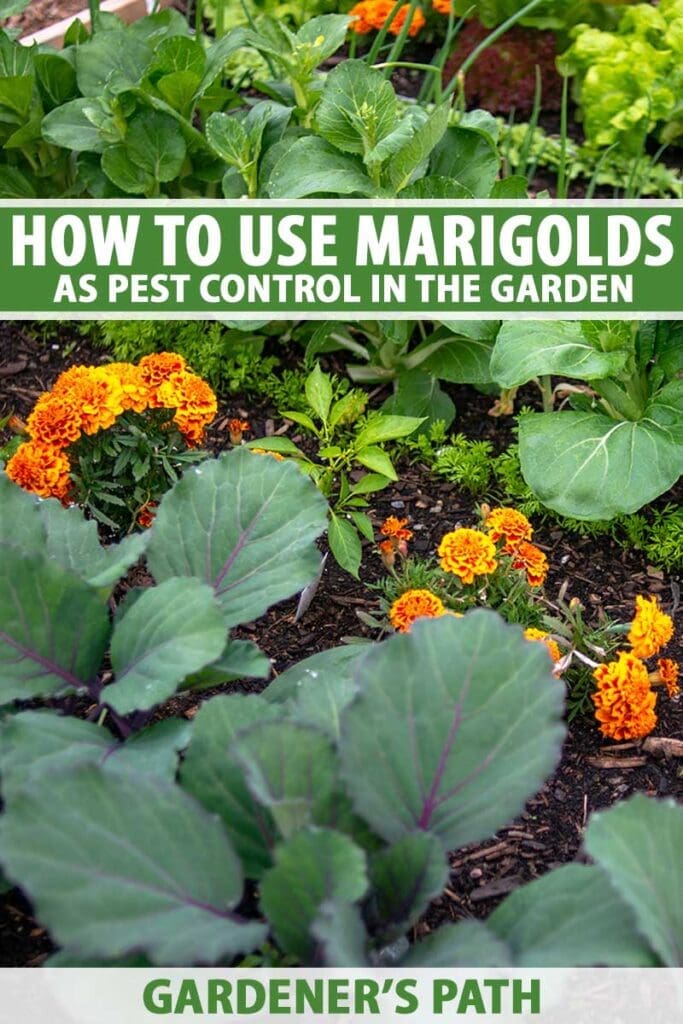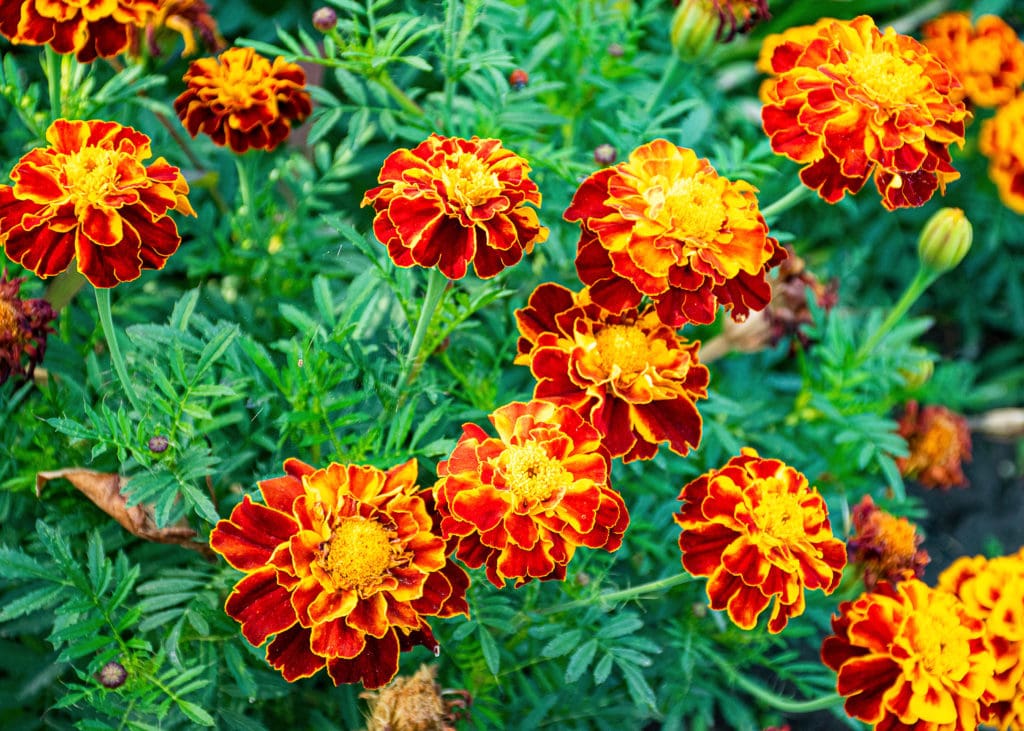If you’re looking for a natural way to keep pesky insects at bay, look no further than marigolds. These vibrant, sun-loving flowers not only add a pop of color to your garden but also serve as a reliable pest control solution. In our latest blog post, we’ll explore the different varieties of marigolds and highlight which ones offer the best protection against common garden pests. Whether you’re dealing with aphids, nematodes, or whiteflies, discover how these beautiful blooms can help you maintain a pest-free environment without the need for harmful chemicals. So, grab your gardening gloves and join us as we uncover the power of marigolds in pest control.

Marigolds and Pest Control: Which Varieties Offer the Best Protection?
1. Introduction to using marigolds for pest control
When it comes to protecting your garden from pests, marigolds can be a gardener’s best friend. These vibrant and versatile flowers not only add beauty to your garden, but they also serve as a natural pest deterrent. Marigolds have long been used in companion planting to keep harmful insects at bay and protect other plants from damage. In this article, we will explore the concept of companion planting and delve into the benefits of using marigolds specifically for pest control. Additionally, we will discuss the different varieties of marigolds available and highlight the characteristics and effectiveness of African marigolds in particular. Finally, we will provide some best practices for planting and maintaining African marigolds to ensure optimal pest control in your garden.

2. Understanding the concept of companion planting
Companion planting is a gardening technique that involves growing different plants together to benefit one another. Certain plant combinations can provide mutual support by repelling pests, attracting beneficial insects, enriching the soil, and improving overall plant health. Marigolds are known to be excellent companions for various vegetables, herbs, and flowers, thanks to their natural insect-repelling properties. When marigolds are strategically planted alongside susceptible plants, they can help deter pests and prevent infestations, reducing the need for chemical pesticides.
3. Benefits of using marigolds for pest control
Using marigolds for pest control offers numerous benefits for both the garden and the gardener. Firstly, marigolds emit a distinct odor that repels many pests, such as aphids, nematodes, whiteflies, and tomato hornworms. This natural defense mechanism acts as a deterrent, keeping these pests away from your valuable plants. Secondly, marigolds attract beneficial insects, like ladybugs and hoverflies, which prey on harmful pests, providing a natural form of pest control. By attracting these beneficial insects, marigolds help maintain a balanced ecosystem in your garden. Lastly, marigolds are easy to grow and require minimal maintenance, making them an ideal choice for novice gardeners or those looking for low-maintenance pest control solutions.

4. Different varieties of marigolds
Marigolds come in various sizes, colors, and growth habits, offering a wide range of options for your garden. The most common varieties are African marigolds (Tagetes erecta), French marigolds (Tagetes patula), and signet marigolds (Tagetes tenuifolia). Each variety has its own unique characteristics and suitability for pest control purposes. In this article, we will focus on African marigolds, as they are renowned for their effectiveness in repelling pests.
4.1 African marigolds (Tagetes erecta)
African marigolds, also known as American marigolds, are the largest and tallest marigold variety, reaching heights of up to three feet. These robust plants produce large, pom-pom-like flower heads in vivid shades of yellow, orange, and gold. African marigolds are particularly effective in repelling a wide range of pests, including aphids, whiteflies, and nematodes. Their strong fragrance and bitter taste make them unappealing to these pests, acting as a natural deterrent.
4.1.1 Characteristics and features
African marigolds stand out for their impressive size and sturdy stems, which make them ideal for creating borders or adding height to your garden beds. They have large, showy flowers with densely-packed petals that bloom profusely throughout the summer months. The vibrant colors of African marigolds can add a pop of cheerfulness to any garden, attracting attention and enhancing the visual appeal of your outdoor space.
4.1.2 Effectiveness in pest control
In terms of pest control, African marigolds are highly effective due to their strong scent and chemical compounds that repel pests. Their aromatic foliage releases a pungent odor that insects find unpleasant, leading them to avoid the area altogether. Additionally, African marigolds secrete a substance called alpha-terthienyl, which has been shown to suppress the activity of nematodes, microscopic worms that can cause significant damage to plant roots. This combination of scent and chemical compounds makes African marigolds a powerful tool in the fight against garden pests.
4.1.3 Best practices for planting and maintaining African marigolds
To maximize the pest-repelling benefits of African marigolds, it is important to follow some best practices for planting and maintaining these vibrant flowers. Firstly, select a sunny location in your garden, as African marigolds thrive in full sun. Ensure that the soil is well-drained and enriched with organic matter, as these plants prefer fertile soil conditions. When planting African marigolds, provide enough space between each plant to allow adequate air circulation and prevent overcrowding. This will help minimize the risk of pests and diseases.
In terms of maintenance, African marigolds require regular watering, especially during dry periods. However, be cautious not to overwater, as excessive moisture can lead to fungal diseases. Deadheading, or removing faded blooms, is essential to encourage continuous flowering and prevent the plants from going to seed too quickly. Lastly, keep a close eye on your African marigolds for any signs of pests or diseases, and promptly address any issues that arise to maintain their effectiveness as a pest control measure.
7. Related product reviews for optimal pest control
To complement the use of marigolds for pest control, there are various related products available that can enhance your garden’s defense against pests. From organic pest sprays to beneficial insect attracting plants, these products can work synergistically with marigolds to create a pest-resistant environment. In our related product reviews, we will explore the top-rated pest control products on the market, providing detailed information and insights to help you make the best choices for your garden.
In conclusion, marigolds offer a natural and visually appealing solution for pest control in your garden. By understanding the concept of companion planting and harnessing the benefits of marigolds, you can create a more balanced and pest-resistant ecosystem. African marigolds, with their impressive size, vibrant colors, and potent pest-repelling abilities, are particularly effective in this regard. By incorporating these beautiful flowers into your garden and following the recommended best practices, you can enjoy the benefits of pest control while adding a touch of beauty to your outdoor space. So, why not give marigolds a try and watch as they ward off pests, leaving your plants to thrive in peace?


I am Randy, the author behind PestControld.com. Drawing from decades of experience, I aim to provide valuable insights, expert advice, and practical recommendations to help you make informed decisions when assessing viable pest control solutions.